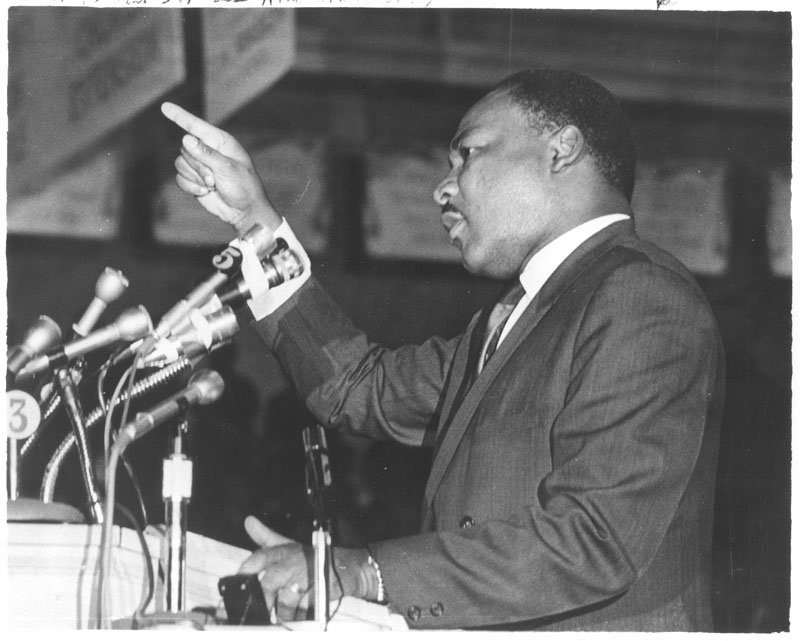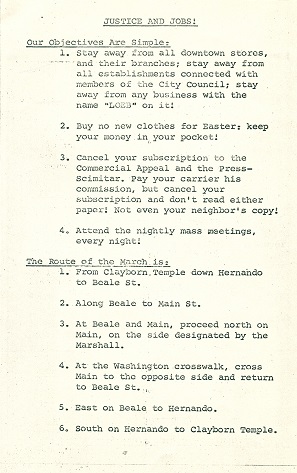
“MLK at Mason Temple.” Volunteer Voices: The Growth of Democracy in Tennessee. Original Image: Special Collections Dept., University Libraries, University of Memphis.
March 23, 1968
The excitement in the room was almost palpable Tuesday night as Dr. King spoke to those assembled at Mason Temple. In addition to speaking in support of the ongoing strike, many hoped he would lend his presence to one of the nearly daily marches or protests in the city. Although it was eventually disclosed he would not march during this visit to Memphis, he announced a march downtown for Friday, March 22, and called for a work stoppage the same day. Ultimately, the snow helped enforce the work stoppage, but the weather also resulted in the demonstration being cancelled as Dr. King could not travel to Memphis.
Scheduled to begin at 7 PM, the anticipation for Dr. King’s speech resulted in rally attendance of 9,000 to 13,000 as estimated by the police and organizers, respectively. While other speakers held the crowd’s attention, his arrival at 9 PM was met with thunderous applause.
During his hour-long speech, Dr. King suggested that the strike is not only about money; the right to organize is equally important to remedy the present power disparity. However, he also argued whatever steps are made toward social equality must be supported by gains in economic equality: “what profit was it for a man to get the right to eat at an integrated lunch counter when he did not have money for a hamburger and a cup of coffee or right to stop at a motel when he did not have enough money for vacation.”

“March for Justice and Jobs Program.” Civil Rights Collection, DIG Memphis.
He also criticized the difference between how much the government spends to kill one Viet Cong soldier ($50,000) and how much the government spends per person to fight poverty in the US ($53). He believes this gap is even more glaring because of the racial stereotypes associated with poverty in the US: “When there is mass unemployment, and under-employment, in the black community it is called a social problem. Put the same things in the white community and they call it a depression.”
To correct these issues in Memphis and in the rest of the US by extension, Dr. King called for the social and economic uplifting of less desirable occupations, such as the sanitation worker. He said, “Our society must come to respect the sanitation worker. He is as significant as the physician for if he doesn’t do his job, disease is rampant.” Unless there was progress towards a dues-checkoff for the sanitation workers and right to organize, he proposed a citywide work stoppage: “I will return to Memphis Friday. We will not go to schools, places of work or deal with merchants downtown.”
Reactions to the proposed work stoppage came swiftly from two city council members. Mrs. Wells Awsumb said, “I think it is irresponsible” and Bob James stated, “Frankly, as a councilman, my patience is wearing thin and my heart is hardening.” The inclusion of such a national figure may not sit well with local authorities because of the extra attention it is likely to attract, but strike supporters were thrilled to have Dr. King’s support and commitment to lead a march.
Whether Memphians decided to participate in the work stoppage or decided the journey to work was too perilous because of the record snow is unknown, but the city was mostly quiet on the day of the planned march. The weather did cancel Dr. King’s flight to Memphis, however, so the march was not held. Asked if there were plans to reschedule the march, Rev. James Lawson replied, “We’ll have to re-examine it. At least we have a complete work stoppage now. It’s 95 percent successful.”
“12,000 Fill Up Mason Temple for King Talk.” Tri-State Defender, March 23, 1968.
“Dr. King will not take part in March While in Memphis.” Press Scimitar, March 18, 1968.
K. W., Cook. “King Urges Work Stoppage by Negroes to Back Strike.” The Commercial Appeal, March 19, 1968.
“King’s March is Canceled by Snow.” Press Scimitar, March 22, 1968.
“King Plans to Return for March.” Press Scimitar, March 19, 1968.






